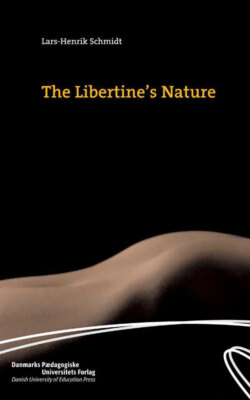Читать книгу The Libertine's Nature - Lars-Henrik Schmidt - Страница 9
На сайте Литреса книга снята с продажи.
Le Philosophe
ОглавлениеSade considered himself a “philosophe”; in his era this meant very precisely a critical use of reason against the existing institutions, first of all the church, which was equated with disgracefulness. The critical practice turned toward the two bodies functioning up to that point as obstacles to the progress of philosophy, namely, authority and the systematic soul. In clerical reasoning it was an inner relation that prevented a localization of truth; that is to say, pride: in humble practice, pride could bring about a downward climb in the search for truth, which is why the problem could be helped through a self-practice. The enemy for the Enlightenment critic is externalized and the criticism of reason coincides with an emancipation. As a philosopher, Sade is also an emancipation theorist; however, he does not only want to deliver himself from the other, he also wants to take advantage of the other.
He is a libertine. We are going to take an interest in his nature rather than the conceptual history of the libertine.
It is therefore as a philosopher that he will be taken seriously, or more precisely, as a thinker: one can learn something by having to overcome Sade. All other things being equal, the will to order expressed in the attempt at overcoming involves a sacrifice, involves a civilizing of Sade’s unruliness. Tidying Sade up to a certain extent seems to me inevitable, for what is terrible in Sade can hardly be expressed. Sade is not tidy: his world of thought is dreadful. Sade is not immoral like Nietzsche but unmoral or amoral, as his point is that the will to the good involves evil.
Sade presents the hardships of virtue, its unhappiness, symbolized by the fair Justine, and he presents the prosperity of vice, symbolized by the dark Juliette. As sisters they belong to the same family, but a broken family. Why use Sade as a prism to call the social into question and to ask whether a different ethics is possible? Because he can give rise to a calling into question of the precedence of virtue in ethical thought. Precisely because on the whole he is the complaint against thinking in grooves about ethics; because he calls the precedence of the other into question rather than simply questioning the arguments for this precedence. The social and ethics are therefore what is at issue – and not taken for granted. To Sade the social is not a matter of course such as it has become for many good reasons in the twentieth century at a time when metaphysics has become a social metaphysics; but when it has also become matter-of-course, all too matter-of-course, and as such almost un-thinkable. As we shall see, tradition believes that it can provide the answer even though it merely is the answer. Association with Sade recalls the question mark that should not be denied or suppressed but that as a consequence of active forgetting can simply be withdrawn.
